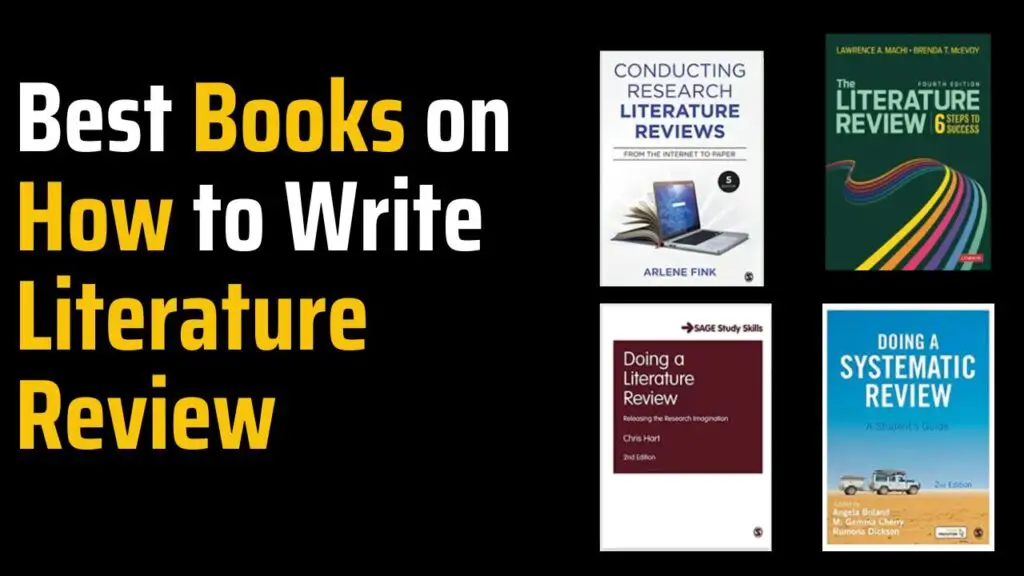In this post, you will find the good books on writing a literature review.
These books address a range of topics related to the writing and publication of literature reviews, such as systematic review methodology, APA style guidelines and searching literature online.
These materials can help you organize your work so that it is thorough and effective, regardless of your level of experience with writing literature reviews.
1. Doing a Literature Review

by Chris Hart
In its second edition, “Doing a Literature Review” sheds light on the “what,” “how,” and “why” of literature reviewing.
It covers the entire literature review process, introduces different types of reviews and evidence evaluation, and offers practical examples to apply key techniques and procedures.
This book combines a critical approach with practical examples, empowering you to produce high-quality literature reviews.

2. Conducting Research Literature Reviews: From the Internet to Paper
by Arlene G. Fink
Focused on synthesizing research literature, this book provides in-depth guidance for designing and managing research studies.
It offers strategies for effective literature searches, critical evaluation of sources, and writing high-quality literature reviews for various disciplines.
3. The Literature Review: Six Steps to Success

by Lawrence A. Machi and Brenda T. McEvoy
This book presents a systematic approach to writing literature reviews, guiding readers through each step of the process.
With practical tips, examples, and exercises, it helps both beginners and experienced researchers develop a clear understanding of literature reviewing.

4. Published
by Thomas Deetjen
“Published” is a comprehensive handbook that organizes the research process into seven distinct phases, each with step-by-step instructions.
The goal of the book is to guide you from the start to the finish of your research journey. It gives you the clarity, direction, and encouragement you need to see your project through from start to finish – publication.
5. An Introduction to Systematic Reviews
by David Gough, Sandy Oliver, and James Thomas

Focused on using systematic review as a research method, this book offers clear advice on the logic and processes of systematic reviewing.
The second edition introduces innovative approaches to research synthesis and covers statistical synthesis, text mining, and qualitative comparative analysis.
With examples from various disciplines, it serves as an invaluable resource for turning systematic reviews into policy recommendations.

6. Doing a Systematic Review: A Student’s Guide
by Angela Boland, Gemma Cherry, and Rumona Dickson
This guide is a valuable resource for students embarking on systematic reviews.
It provides clear answers to common review-related questions, from formulating appropriate review questions to analyzing and synthesizing data.
With step-by-step guidance, this book equips students with the necessary skills to conduct a successful systematic review.

7. Introduction to Meta-Analysis
by Michael Borenstein, Larry V. Hedges, Julian P. T. Higgins, and Hannah R. Rothstein
“Introduction to Meta-Analysis” is authored by leading authorities on meta-analysis. It provides an outline of meta-analysis in the research process, explains how to compute effect sizes and treatment effects, and addresses variations in effect size across studies.
This book is a comprehensive guide to mastering the techniques and avoiding common mistakes in meta-analysis.
8. Systematic Approaches to a Successful Literature Review
by Andrew Booth, Anthea Sutton, Mark Clowes, and Marrissa Martyn-St James

This practical guide offers step-by-step processes for conducting literature reviews with any type of data.
It includes worksheets, decision aids, and troubleshooting tips to help you plan, organize, and navigate your literature review effectively.
9. Systematic Reviews in Educational Research
by Olaf Zawacki-Richter et al.

This open-access book explores the systematic review method as it applies to educational research.
It provides an introduction to systematic reviews, methodological considerations, and practical examples, making it a valuable resource for researchers in the field of education.

10. Searching the Grey Literature
by Sarah Bonato
This guide is an essential resource for researchers interested in exploring grey literature.
It offers effective search strategies and emphasizes the importance of this vast body of literature in research.
It is particularly useful for librarians and information professionals.
11. Publication Manual (OFFICIAL) 7th Edition of the American Psychological Association

by American Psychological Association
Considered the authoritative source for APA style guidelines, this manual provides comprehensive guidance on writing and formatting scholarly papers, including literature reviews.
It is an indispensable resource for writers, researchers, and students in various disciplines.



